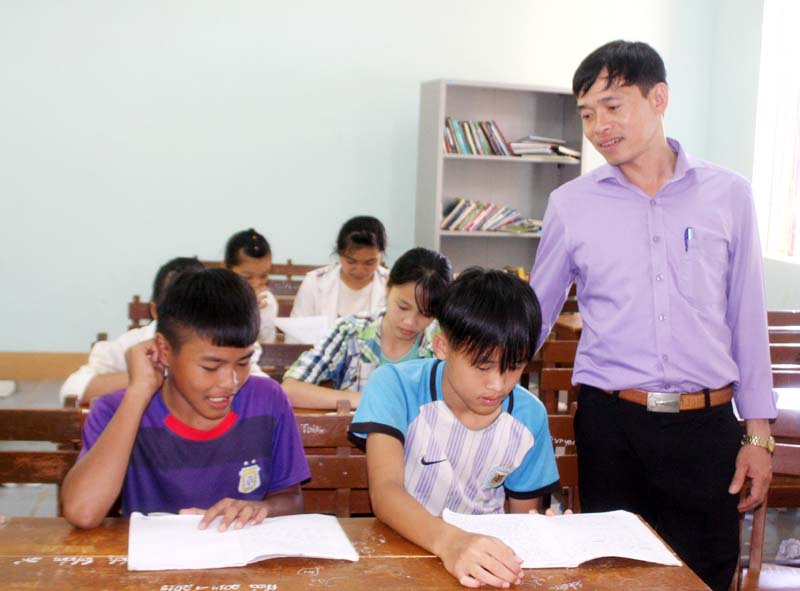
(HBO) – When talking the education in the poor commune - Tan Dan (in Mai Chau district), the story in which many teachers go to class in the day time, and they go fishing in Da River in order to improve the meals for students at night has become a fairy tale in modern life. Particularly, the principal – Ha Manh Quyet is compared to the pioneer for the educational development in the difficult area.

The teacher, Ha Manh Quyet, is always devoted
to his lovely students.
Mr. Quyet remembered: "In 2009, I was
arranged to work at Tan Dan Secondary School. This was a very difficult commune
with adverse traffic. The commune had two residential areas, one was located
near Da River bank and the other was on the high ground. Also, there was a
hamlet far from the center by 15 km, hence, the mobilization of students going
to class faced many challenges. For children to access the education, their
parents had to build bamboo cottages around the school and bring food down to
the school. Looking at the shortage of food and accommodation, we pitied them
so much. After concerning a lot, I realized that people went to fishing and
casted the net at night. They caught a large number of fishes and shrimps,
therefore, I intended to buy a net to go to fishing with purpose on enhancing
the meals for students. This idea was received many supports and agreements so
other teachers donated money to buy a net in Tien Phong commune (Da Bac
district) with the price of 5 million VND.
In the day of class, I concentrated on my
plan notebook. At 11 pm, I closed the plan notebook and went with other teaches
to the river to cast the net and catch fish and shrimp for students. At five
o'clock in the morning, all teachers waked up again and casted the net one more
time. As a habit, day after day, this was a lucky day for us to catch a lot of
fish and shrimp. However, there were some unlucky days when we caught nothing. But,
all teachers still diligently desired to improve the meals for students”.
His house is at Xam Khoe commune, far from 80
km to the school. Although this is far distance, Mr. Quyet does not mind
because of his dear students.
Mr. Quyet said: "Comparing to 5 years ago,
the quality of education of the school has changed positively. By 2011, this
was the first time that the school had students awarded the prize of excellent
student at district level. In addition, although the roads were difficult to
travel from the school year 2015 to 2016, the school did not have students drop
out. In recent time, the school had a teacher awarded the second prize of good
administrational teacher at provincial class”.
More than just an information technology teacher, Bui Van Nien is an inspiring figure who has nurtured the scientific curiosity and creative spirit of students in Vietnam’s ethnic minority communities.
Da Bac is the most disadvantaged mountainous district in Hoa Binh province, with ethnic minorities accounting for about 90% of its population. Over the past years, the district has mobilised resources to implement ethnic policies to improve the quality of life of local people.
In recent years, Hoa Binh province has consistently prioritised the protection, care, and education of children, particularly those from ethnic minorities and disadvantaged backgrounds, by creating a safe, healthy, and nurturing environment for their all-round development.
The Steering Committee for Tobacco Harm Prevention and Control of Hoa Binh province, in coordination with the Tobacco Harm Prevention and Control Fund, held a ceremony on May 28 in response to the World No Tobacco Day (May 31) and the National No Tobacco Week (from May 25 to 31). The event was chaired by Nguyen Van Toan, Standing Vice Chairman of the provincial People’s Committee and head of the Steering Committee.
Since 2021, the Center for Industrial Promotion and Industrial Development Consulting (CIIDC) under the Department of Industry and Trade has been implementing a school lighting model as part of the plan for using energy efficiently and economically in Hoa Binh Province in the pẻiod of 2021 - 2025. This model not only aims to improve the learning conditions and enhance the education quality, but it also promotes the message of energy saving, energy security, environmental protection and contributes to the goals of socio-economic development.
In the 2024 - 2025 school year, the entire Hoa Binh provincial education sector includes 520 educational institutions and schools. Among them are 13 ethnic boarding schools with 153 classes and 4,487 students. Four of these schools have met national standards, reaching 30.7 percent.



